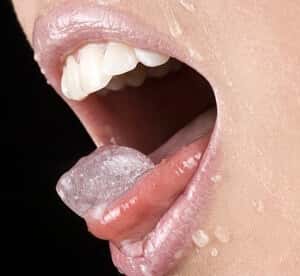
When readers report that they are addicted to ice, it sends off alarm signals for us. Craving ice like this (quite different from preferring a little ice in your drinking water) is often linked to mineral deficiencies, especially iron or zinc. It is important to get to the root of the problem and correct it. The deficiency can cause serious health concerns. For example, cracking ice with the teeth can damage them. What’s more, the cause of the deficiency may also be dangerous. Doctors should investigate what is driving this behavior.
What Does Craving Ice Mean?
Q. I used to crave ice just like a drug addict. The first thing in the morning I had to have it. I would get a large soft drink and ask for extra ice. The pop didn’t matter to me–it was the ice I wanted.
When I saw my doctor for a check up because I felt tired and short of breath, a test showed that I was severely anemic, with a blood count of six. My physician was so concerned that he called me at home the next evening and told me not to exert myself in any way until they did further testing.
This had happened so gradually that I didn’t realize I was slowly bleeding to death. Further tests showed I had an iron deficiency caused by extremely heavy periods. Iron supplements quickly brought my count up to normal ranges, and my cravings for ice went away immediately. They never returned, though it has been many years.
Correcting the Deficiencies That Lead to Cravings:
A. Mineral deficiencies can result in unusual cravings, whether for ice, cornstarch, clay or even popcorn. In addition to the heavy menstrual bleeding our reader had experienced, people who donate blood frequently sometimes develop cravings for ice or other substances (Transfusion, April 2017). Other causes may include pregnancy or unsuspected intestinal bleeding. Doctors are more likely to suspect iron deficiency in women, but men too may develop an ice addiction if they are anemic (Blood Cells, Molecules & Diseases, July 2019).
Anyone who discovers such a craving should ask their health care provider to test iron or zinc levels (Journal of the American Association of Nurse Practitioners, Feb. 2016). Usually, as in your case, correcting the deficiency banishes the craving. This is especially important for children who may be eating paint chips, since their craving could lead to lead poisoning (Australian Family Physician, 2017).
Bea remarked:
“I was addicted to chewing ice. I also had terrible restless legs. About 25 years ago I tried to donate blood and my iron was extremely low. They told me to go to the doctor. Once my iron was back up where it belonged, both problems went away. I occasionally still get restless legs, but that only happens when I am very tired or lacking sleep. A good night’s sleep takes care of it.”
Craving ice in this way is classified as “pica” by doctors. In some regions of the country, people don’t find it unusual to crave clay or cornstarch.
TA’s description of her habit sounds a lot like addiction:
“I am 26 years old as of today. I started to eat cornstarch when I was 16. At first I ate a box every three weeks, but now I’m eating it through a straw and I’m up to a box a day. I know that this is abnormal and hurting me because I do not use the restroom as often as I should.
“I eat it even when I don’t want it, yet I can’t stop. My mom eats it as well. Can you please help me and tell me what it is that I can do in order to stop because it’s messing up my teeth and I’m gaining weight?”
We strongly recommend to TA and others struggling with this problem that they be checked for iron or zinc deficiency and take any supplements that are prescribed or recommended.
Do you have a problem with craving ice to excess? Please share your story in the comment section below.
Citations
- Chansky MC et al, "Qualitative assessment of pica experienced by frequent blood donors." Transfusion, April 2017. DOI: 10.1111/trf.13981
- Barton JC et al, "Pagophagia in men with iron-deficiency anemia." Blood Cells, Molecules & Diseases, July 2019. DOI: 10.1016/j.bcmd.2019.04.002
- Rabel A et al, "Ask about ice, then consider iron." Journal of the American Association of Nurse Practitioners, Feb. 2016. DOI: 10.1002/2327-6924.12268
- Ardeshirian KA & Howarth DA, "Esperance pica study." Australian Family Physician, 2017.

